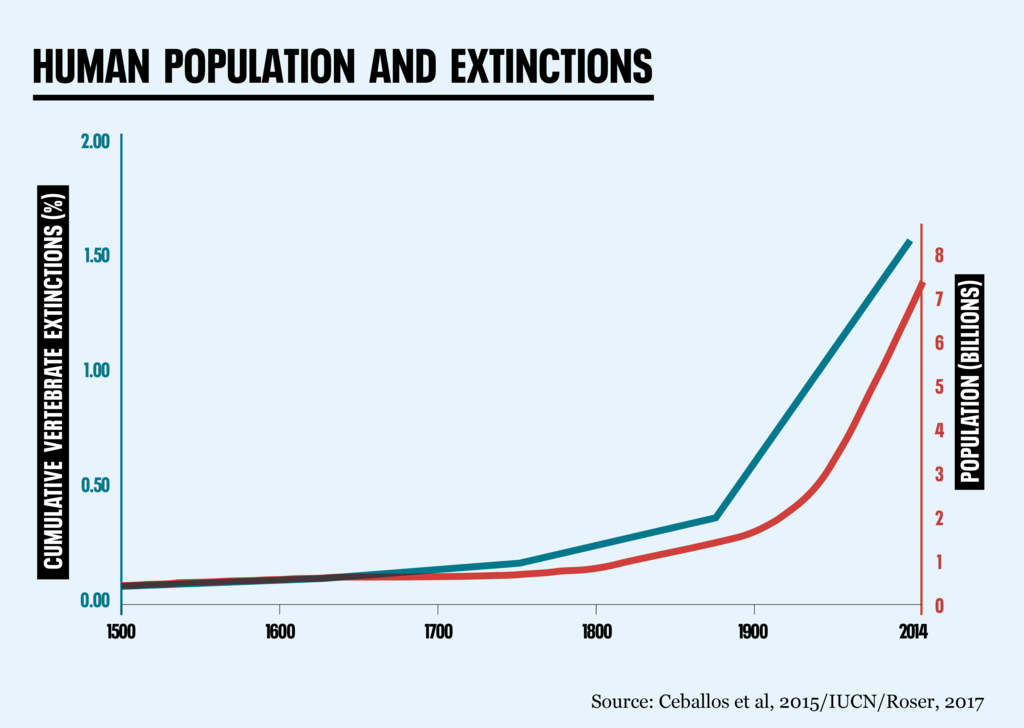Background
The world has a conundrum: Resource consumption is linked to development, but it also leads to ecosystem degradation. Our current paradigm of understanding economic growth tells us that bringing people out of poverty means increasing total resource consumption and thereby further degrading the world’s already strained ecosystems.
The world also has stark inequality: those in the Global South consume very little, yet face greater impacts of this consumption. Those in the Global North over-consume, and many do not feel the full consequences of this consumption. Within countries, there is also inequality, with some over-consuming while others struggle to survive.
Population Growth
Is population control and/or reduction the solution?
We know that the locations with the fastest growing economies also have the fastest growing populations. Studies show that ensuring women have access to education, economic opportunity, and family planning services is the best way to reduce population growth, since women who have the opportunity to choose generally choose to have fewer children.

Yet even stabilizing population growth will not be enough to reduce the population enough to where it would be sustainable for everyone to consume at the rate of the Global North. In order to ensure that there are enough resources to sustainably provide for the world’s population, Global North economies need to radically reduce their resource consumption. This brings us to the concept of economic “degrowth.”
“We cannot rely on global economic growth for long-term development and prosperity.”
-Carina Millstone (source)
Defining Degrowth
Degrowth is a deliberate process of transitioning the economy from one that harms ecosystems to one that works with and within ecosystems. A good definition provided by Schneider et al is the “equitable downscaling of production and consumption that increases human well-being and enhances ecological conditions at the local and global level”.

Degrowth requires a rethinking of our understanding of prosperity. Redefining prosperity in the context of human wellbeing rather than material consumption will help us shift to decarbonized, low material lifestyles.
“Degrowth is an ethical project of global equity.”
-CARINA MILLSTONE (SOURCE)
What degrowth is not: it is not a recession. Recessions are unplanned economic losses, and result in human suffering. Degrowth is a strategic economic reduction, specifically in material consumption, which will equitably increase global economic prosperity. It also does not imply stagnation or a lack of progress. Even without growth in material consumption, there is still much innovation and progress to be made in the areas of health, education, arts, sports, science, and ecosystem relations.
Metaphorically speaking, degrowth is not about making an elephant smaller, it’s about turning an elephant into a snail.

Who does degrowth apply to? In this case, it really only applies to countries in the Global North. Impoverished countries in the Global South still need to develop their economies and bring their populations out of poverty.
What will this look like? In the Global North, a smaller economy may mean a shorter work week and more focus on essential work and fulfilling activities rather than busywork. Progress would likely be measured by well-being rather than GDP. In the Global South, countries would prioritize sustainable economic development and well-being of their citizens, rather than growing their GDP.
Want to learn more? Here are a few OSU classes that might be of interest!
- GEOG 330: Geography of International Development
- AEC 243: Global Poverty and Sustainable Development
- GEOG 331: Population, Consumption, and the Environment
- SOC 360: Population Trends and Policy
Oregon State University in Corvallis, Oregon, is located within the traditional homelands of the Mary’s River or Ampinefu Band of Kalapuya. Following the Willamette Valley Treaty of 1855, Kalapuya people were forcibly removed to reservations in Western Oregon. Today, living descendants of these people are a part of the Confederated Tribes of Grand Ronde Community of Oregon and the Confederated Tribes of the Siletz Indians.
CATEGORIES: sustainable development


